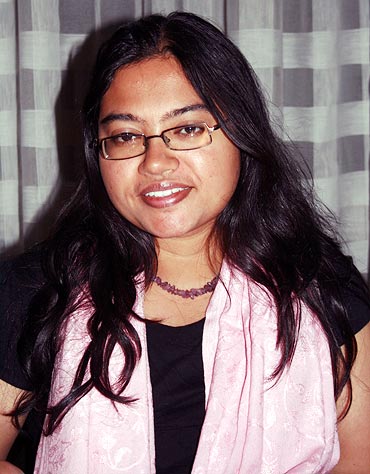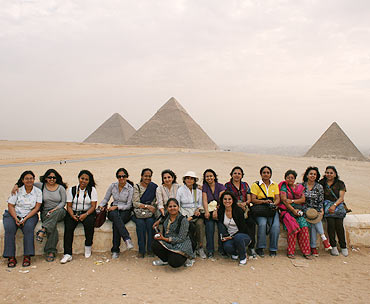
It took the soft-spoken Piya Bose a full year to realise that she wasn't cut out to be a corporate lawyer. In 2008, Bose quit her high-paying job in a prominent Mumbai law firm so she could follow her heart. Today, she runs Girls on the Go Club, an only-for-women travel club that believes in helping women travel to new, exotic destinations.
The business she started up with no capital has already taken over a 100 single women travellers to places they've possibly never dreamed of. Here she tells Abhishek Mande what it takes to start a business with no money and how she has been harnessing the power of the internet to make her business run.
How did you get the idea of starting Girls on the Go Club?
I have been a solo traveller for many years now (she was 16 years old when she first travelled alone -- to Brazil and Argentina) and have been writing travel pieces for newspapers and magazines. Once my husband and I were in Lucknow and were thinking of planning a summer vacation. We were exploring the regular options like Himachal and Uttaranchal. Then an auto rickshaw driver suggested we try out Nepal since it isn't very far from Lucknow. That got me thinking. I convinced my husband and off we went.
Once we were in Nepal we saw a lot of travel agencies promoting Tibet. And that was how we landed in Tibet. This journey was absolutely unplanned but was life-changing. The mere experience of being on the highest plain and looking at the highest mountain peak in the world was different and exciting. When I came back I was sure I didn't want to go back to the corporate law firm I was working for.
Why did you choose to start something with such a niche appeal?
During my travels I noticed that not a lot of Indian women were travelling on their own. Having hosted many solo women travellers (from foreign countries) at my place I got inspired to start something that would encourage Indian women to travel by themselves. But most of all I wanted to (bust) the myth that it is unsafe for women to travel.

How did your family react when you decided to quit?
The initial reaction was not very nice. My parents were upset since I had given up a lucrative job in a big firm. My husband too was (sceptical). As for me, I had to tune myself to a lot of things. When I was in the job, all the comforts were paid for. I had to consciously tune myself and travel by public transport. But it was very liberating.
My parents were also concerned since I only had a legal background and had done nothing in the travel business. In retrospect though, being a lawyer helped shaped my thought process. It also helped me connect with my clients -- who come from all kinds of different professions -- at a level they would have liked. It turns out now that my legal training is of more help to me now that it was when I was a practicing lawyer.
Tell us something about your first trip as part of Girls on the Go.
In 2008, I announced my first trip. Call it beginners luck but 25 women responded to the advertisement. It was a great number to start with. The trip was to Ladakh at a time when the place was only frequented by rugged bikers. We made a lot of heads turn and were asked a lot of questions about how women were travelling to Ladakh! There were women as young as 16 and as old as 65 with us.
Since most women were from upper middle class and upper class families and metropolitan cities, I wasn't sure how they would take to things like camping and sleeping in tents. I had planned a soft trip. But I was surprised because most of them wanted a lot more. The trip was a great learning experience for me as well -- of what other women want (or do not) want to do on a trip!
What is your business model like?
It is currently a sole proprietorship startup. I work from home and don't have any employees as yet. But I do have partners in various cities and countries -- ground-handling agents who help me out with the operations.
What are ground handling agents?
They are local people do all the bookings, arrange for guides, drivers (in our case) bouncers, etc and take care of all the ground support at the place we are visiting. While I coordinate everything from here, these people take care of all the grassroots-level needs.
Do you go on all your trips?
So far I have been with all except one. The idea is if it is a new place I try and go there myself. But as the business expands I might not be able to go each time. So I am training local female guides and getting them tuned into what we require and then let them take over.

How do you ensure your trips are different from the rest?
We try and pack in as many different experiences as possible. For instance during the (latest) Egypt trip, we left one day with no fixed agenda where the travellers could do what they wanted and go where they pleased. We are targeting more international destinations too now and there is much on the anvil. But it is too early to talk about it.
As an entrepreneur, what have been your biggest challenges?
When I quit my job, I did not have any money to start a business. I started off with the conviction that there has to be a way to start up without any capital. To overcome this, I started using various cost-effective methods of marketing. I used social media and free classifieds is newspapers to get initial visibility. Then I left it to my clients. Women love to talk and you can trust if two women like something they will recommend it to twenty others.
The other major challenge has been to convince women to travel by themselves. For this I try and meet them personally and talk to them and their families. There have been times when women have specially requested that I speak with their husbands or their parents. But on the flipside everyone I have met up with so far has turned up for the trip. Meeting these women also helps me bond with them on a personal basis and understand their needs and who I could pair them with on the trip.
You mentioned social media. How do you use the internet to promote your business?
My first clients came from Facebook and Orkut. Eventually I started posting ads on Facebook, which I continue to do even now. Since my clientele largely includes women who are independent, advertising on sites like Facebook makes sense. The ads reach the right profiles and people respond. At one point I was investing more in ads than I was making profits but I know that in the long run it will help. Plus most of my interaction happens on email and I have a website too.

What about challenges as a traveller?
At time gossiping becomes an issue. As a tour manager you have a lot of things on your mind and if there is a problem sometimes women end up discussing only within themselves. What we are trying to do is to orient our travellers and make them understand that if there is something they are not happy with the person to reach out to is the tour manager and not the fellow traveller.
As women travellers we do tend to get some amount of unwanted attention. Egypt for instance is one of the most women unfriendly countries in the world. To avoid any mishaps we travel with bouncers. So far nothing untoward has happened.
How much money does it cost to travel with Girls on the Go?
If you are looking at a weekend package -- we recently travelled to Mahabaleshwar and Panchgani -- it won't cost you more than Rs 8,000. We usually travel with not more than 15 to 20 people so we are able to give personal attention.
Tips for young entrepreneurs:
Tips for single women travellers:
How do you plan to take your business forward?
We have a few plans for this year that I cannot reveal immediately. But we are looking at more international destinations now. Eventually we also plan to grow, rent out an office space and hire people. Girls on the Go Club however will not move away from women travellers.